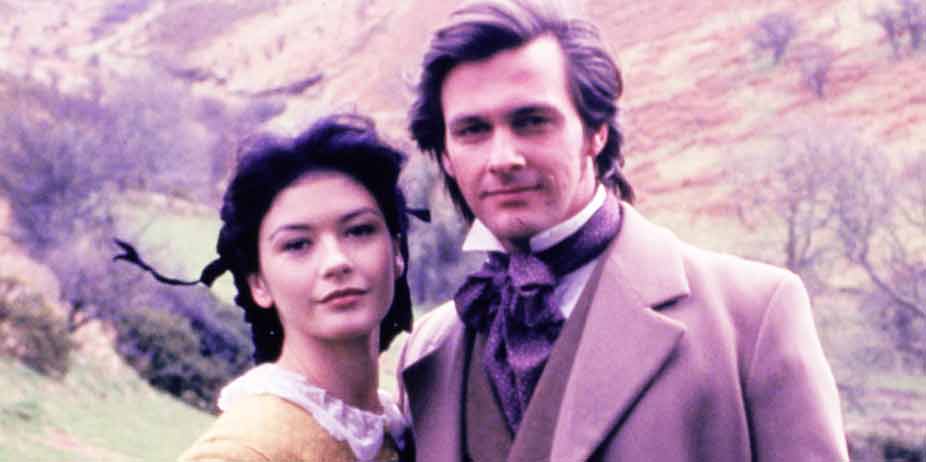 The
Return of the Native (1994)
The
Return of the Native (1994)
Few of Thomas Hardy's works are the light summer reading of Little Women, nor do they carry a poignant message of hope as most of Dickens'. Perhaps this is why modern audiences are so fascinated with them. We empathize and pity Tess of the D'Urbervilles, and find Eustacia of The Return of the Native mysterious and haunting. This adaptation of the latter has a beautiful cast, a memorable musical score, and beautiful costuming. And like the book, it will leave a vivid if ethereal impression on the unwary viewer.
Superstition runs rampant in the small town upon the moors where children are locked up at night for fear of cursing, and suspicion of witchcraft is fairly common. Most of the speculation on this subject centers around the beautiful and strange granddaughter of the local reverend. Eustacia Vye (Catherine Zeta-Jones) keeps to herself, taking long walks upon the moors and haunts the darkness with a bitter solitude. She has also "bewitched" all of the young men in town into falling madly in love with her. Few know Eustacia's true intentions or heart... the fact that more than anything she wants to escape her gray, cruel existence and travel abroad to Paris. The love struck males in her life are but a plaything, something to toy with. Among them is Damon Wildeve (Clive Owen), a man of notable reputation with whom she has been carrying on a secret romance, despite his betrothal to the shy and insecure Thomisa Yeobright (Claire Skinner). Thomisa's mother is not favorable to the match, since she suspects that the boy is involved with the "local witch." But love wins over prejudice and the pair are allowed to marry; Damon in loathing as Eustacia releases him conveniently from her grasp... she has a better quarry.
Thomisa's cousin Clym (Ray Stevenson) is a man of some means with a teaching position abroad in France, and he's coming back to his childhood home to spend a few months' needed rest. Seeing him as her means of escape from the moors and taking into consideration what the natives are saying about how fine a pair they would make, Eustacia uses all of her powers to bring her into Clym's world... just glimpses does she give him of her pretty face and mysterious aura. And it works like a charm... bewitched, he begins to court her out despite his mother's warnings. But there lies more afoot than a simple game of mixed intentions... for Thomisa's marriage lies on the rocks and Damon becomes increasingly despondent and angry toward Eustacia's newfound happiness. And then there is the mysterious tinker man (Steven Mackintosh) who haunts the moors and knows more than he reveals about the goings on of the townspeople.
Prejudice is mounting... and the natives are hungry for a witch-hunt. Can Eustacia ever learn the true meaning of love... or will she be trapped, not within the moors but within herself, forevermore? Melancholy and evasive, The Return of the Native is a thought provoking and insightful film with an engaging premise but a few cravats for unwary viewers. The film itself is a beautiful work of art... the introduction with a lonely figure walking across a mid-shrouded moor is nothing less than enthralling, as is the haunting score that deserved its Emmy nomination. The flickering bonfires, the lonely expanse of nothingness, and the eerie superstitions that ran rampant throughout lingered in the imagination, creating a breathtaking backdrop for a story that is original and yet familiar. It's a tragedy, it's a romance, it's a mystery... and it's a story of prejudice and betrayal. What I found most intriguing about the film was the preconception that most of the locals believed Eustacia to be a witch. Stories of unjust persecution always appeal to me on an intellectual level... it's sad to see the way that this one plays out. It makes one wonder what would have happed had Eustacia been truly loved among the natives -- if just one individual had taken it upon themselves to give her kindness and offer friendship, everything might have changed. The story would have had a different ending. This only proves that tragedy can come from fear and superstition.
Thematic elements aside, this film isn't actually all that dark in content aside from the plot itself. A married man does continue to pursue romantically another woman, and ultimately they make the choice to run away together. The game is more psychological than visual, teasing you with glimpses, thoughts, and ideas. Some of the scenes are particularly memorable... such as the removal of Eustace's glove, and the moment Clym first sees her on the moors. As with Gone With the Wind and Casablanca, older teens should pause before introducing Eustacia and her world to younger viewers.
